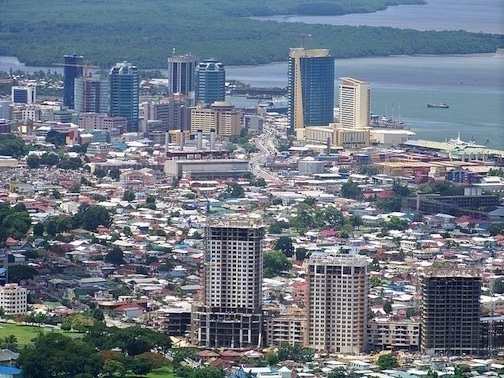Above: Port of Spain
By the Caribbean Journal staff
Trinidad and Tobago’s economy is projected to grow by around 1.5 percent in 2013, according to the International Monetary Fund, which concluded an Article IV mission to the country this week.
“Trinidad and Tobago has suffered from several years of sub-par growth, with economic performance hampered in significant part by supply constraints,” said Elie Canetti, the head of the IMF mission. “In 2012, economic growth is estimated to have been only marginally positive as the country’s energy sector production was held back by maintenance operations, while non-energy output began to recover only late in the year following a sharp and extended drop in cement production that had broad spillover effects. Core inflation remained moderate despite an increase in headline inflation.”
The fund said it expected the country’s crucial energy sector to register only marginal growth, however, due to “significant maintenance-related outages” in the latter half of 2013. There is potential for some upside, the fund said, with greater coordination in the scheduling of maintenance operations between oil and gas producers and the downstream users.
The non-energy sector is projected to grow around 2.5 percent, the fund said, capitalizing on momentum that began near the end of last year.
Trinidad’s fiscal position realized a deficit of 1.1 percent of GDP in 2011/12 from near balance in the previous fiscal year owing to a decline in energy revenues due to output shortfalls, the IMF said, although there was some offset by a drop in current expenditures (as a percent of GDP).
The mission said it projected a fiscal deficit of 2 ½ percent of GDP for the current fiscal year ending Sept. 30, 2013.
“In the long run, Trinidad and Tobago will continue to benefit from an ample non-renewable resource endowment and a highly-educated work force,” Canetti said. “The country’s large reserves of oil and gas have catapulted Trinidad and Tobago to the enviable position of having one of the highest levels of per capita GDP in the hemisphere. However, it is critical to take decisions now to share more equitably the fruits of that wealth across generations and to ensure that future generations can continue to benefit from a high standard of living.”
In order to achieve that, Trinidad needs to rethinking government spending, he said, putting the choices about spending in the “long-term context of the natural reduction in energy reserves.”
“The allocation of spending should be tilted more towards investing in the country’s future capacity to create jobs and growth, and better targeted towards benefiting the most vulnerable segments of the population,” Canetti said. “This will require moving back towards a fiscal surplus over the medium-term while targeting subsidies and transfers towards the poor and ramping up development spending.”
